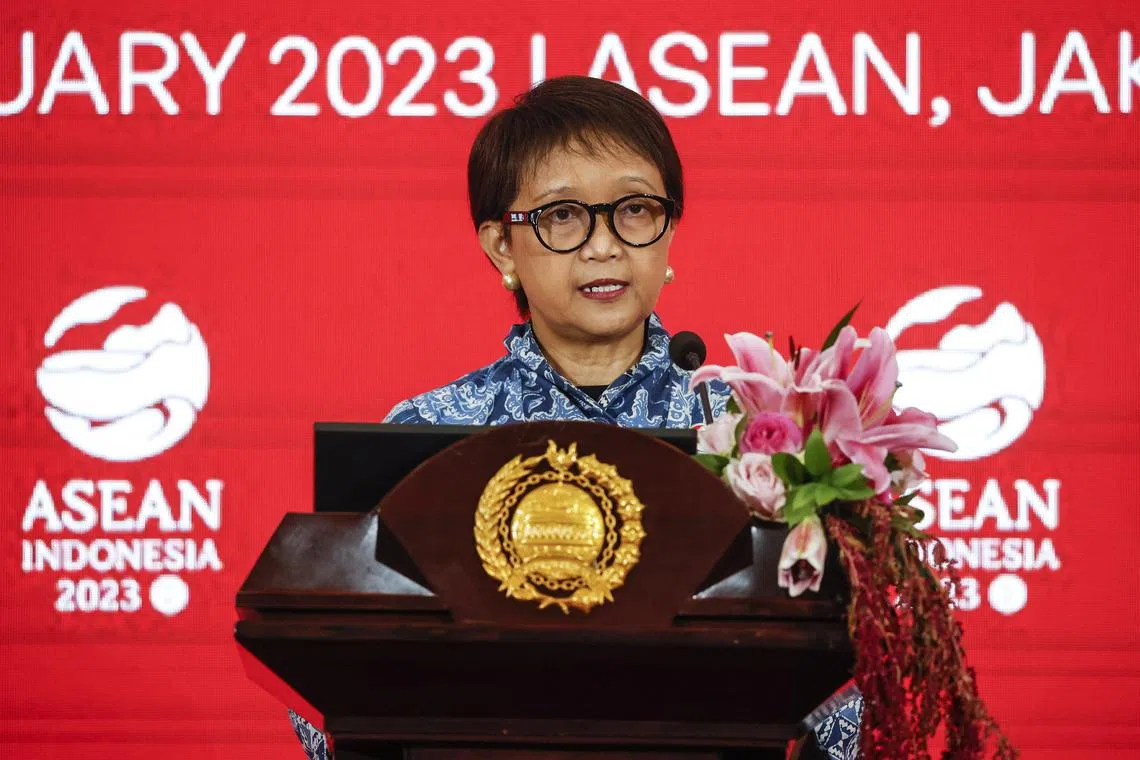Asean chair to hold South China Sea code of conduct negotiations from March
Sign up now: Get insights on Asia's fast-moving developments

Indonesia's Foreign Minister Retno Marsudi delivers a press statement after the ASEAN Foreign Ministers Retreat in Jakarta, on Feb 4, 2023.
PHOTO: EPA-EFE
JAKARTA – Asean chair Indonesia will hold new rounds of negotiations with Asean member states and China from March, as both sides have been trying for years to hammer out a code of conduct (COC) to govern the disputed South China Sea.
Indonesian Foreign Minister Retno Marsudi said at the Asean ministerial retreat in Jakarta on Saturday that the 10-nation regional bloc was also committed to promoting the implementation of the Declaration of Conduct of Parties (DOC).
Inked between Beijing and Asean in 2002, the DOC calls for peaceful resolution of disputes in the South China Sea, where overlapping claims by China and four Asean states – Brunei, Malaysia, the Philippines and Vietnam – and Taiwan have remained unresolved for decades.
Media reports have attributed the slow progress of the negotiations to a lack of agreement, Covid-19 lockdowns and some member states prioritising bilateral ties with China over regional consensus, among other reasons.
“(The) commitment of members to conclude the negotiation of the COC as soon as possible is obvious, bearing in mind the need to have a substantive, effective and actionable COC,” Ms Retno told a press conference.
Indonesia, a non-claimant state, has also clashed with China over fishing rights
Mr Sidharto R. Suryodipuro, director-general of Asean cooperation at Indonesia’s Foreign Ministry, told the same press conference that the intention of Indonesia, the Asean chair, and member states is to “intensify negotiations and explore new approaches”.
Asked what these new approaches are, he did not elaborate but said they will be explored by Asean member states and the bloc’s Chinese partners.
“It’s in an exploratory stage. We don’t know what shape it will take. As in all negotiations, it’s all a process, but the process may be as important as the outcome. The process is also key and this is something we want to intensify,” Mr Sidharto said.
“What’s important is that all of us agree that it has to be effective, implementable, and in accordance with international law.”
Ms Retno lauded the meeting of foreign ministers on Friday and Saturday – which also discussed the situation in Myanmar, and other regional and international issues – as “constructive, substantive, and more importantly productive”.
The ministers on Friday agreed on a “united approach” to deal with the Myanmar crisis through the Five Point Consensus (5PC) strategy adopted by Asean in April 2021.
Ms Retno said that Indonesia’s proposal on the implementation of those commitments had received “broad support” from all member states as a guidance to address the situation in Myanmar in a united manner. This was “very important” for Asean, and for Indonesia as chair, she said.
“It shows a strong unity of Asean members to implement the 5PC,” she added.
The five points in the strategy are the appointment of a special envoy, a visit by the envoy to Myanmar, an end to violence in the country, constructive dialogue among all parties and humanitarian assistance by Asean.
At the Asean meeting, Timor-Leste’s Foreign Minister Adaljiza Magno made her first appearance as an observer, following Asean’s in-principle agreement in November 2022 to admit her country as its 11th member.
To warm applause, she told her counterparts that Timor-Leste’s journey to be part of Asean “is challenging but it’s not an impossible mission”.
“It’s a crucial stepping stone in our long journey to join the big family of Asean community,” she added.
The former Portuguese colony was incorporated into Indonesia in 1976 and gained formal independence in 2002.
It applied for full membership in Asean in 2011, but faced some resistance in part over concerns that it may lag behind other members due to its high poverty level and slow economic development.
World Bank data showed that nearly half of Timor-Leste’s population lives below the extreme poverty line of US$1.90 (S$2.51) a day.
Singapore’s Foreign Minister Vivian Balakrishnan welcomed Ms Magno’s involvement in the meeting as an observer, and reiterated the Republic’s continued support for Timor-Leste’s preparations to join Asean.
“We look forward ultimately to their full membership, but that membership of Asean carries with it heavy responsibilities and obligations. And I think Timor-Leste is also… now getting a better and deeper appreciation of just how heavy that load of responsibilities and obligations will be,” said Dr Balakrishnan.
“So I’d say everyone is welcoming them. But we know that it is quite a steep climb up that hill.”


